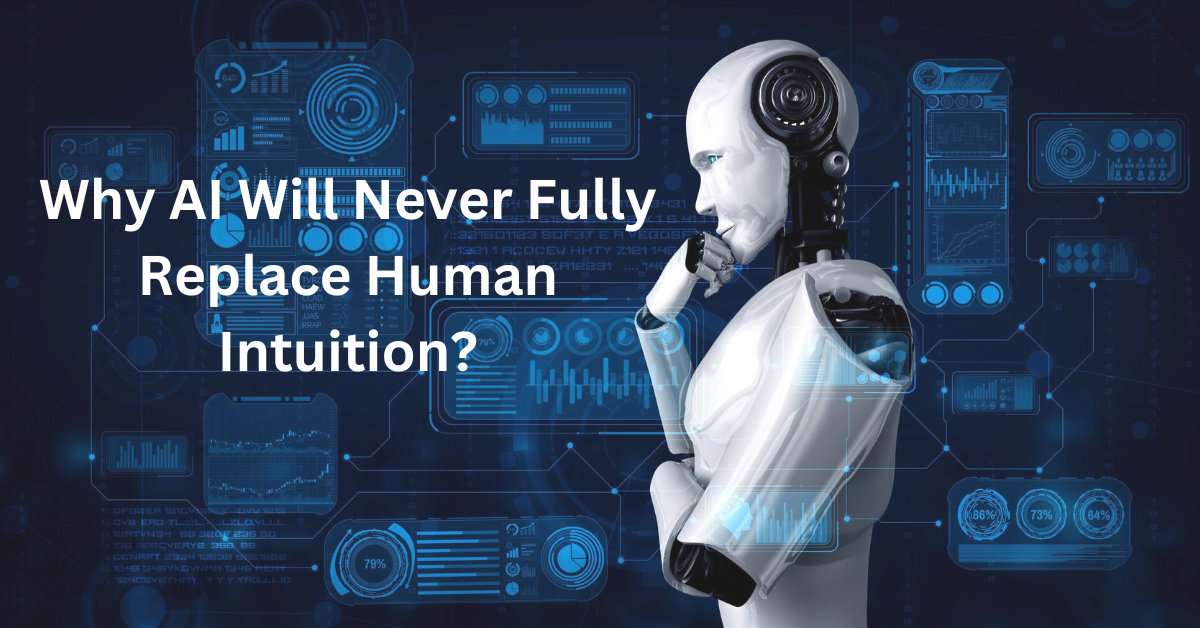Why AI Will Never Fully Replace Human Intuition?
In the era of rapid technological advancements, artificial intelligence (AI) has emerged as a powerful tool that has transformed numerous industries. With its ability to process vast amounts of data and perform complex tasks with remarkable speed and accuracy, AI has become an integral part of our lives.
Also Read This: Don’t Fear AI — Collaborate With It & Maximize Your Potential
However, amidst all the excitement surrounding AI, there remains a fundamental question: Can AI ever fully replace human intuition? This article explores the nuances of human intuition and AI’s limitations, highlighting why AI will never be able to completely replicate the innate abilities of human intuition.
The Essence of Human Intuition
Human intuition is a remarkable phenomenon that allows individuals to make decisions, predictions, and judgments based on instinct, experience, and emotions. It is the subtle interplay between cognitive processes and emotional intelligence that enables us to navigate complex situations, solve problems creatively, and comprehend the nuances of human interactions. Human intuition often defies logical reasoning, drawing on a combination of subconscious cues and personal experiences to arrive at insights that cannot be easily explained or replicated.
The Power of AI
AI, on the other hand, relies on algorithms, data analysis, and machine learning to simulate human intelligence. It excels at processing vast amounts of information, recognizing patterns, and making predictions based on statistical analysis. AI systems have made significant advancements in various domains, from healthcare and finance to transportation and entertainment. They have transformed industries, enhanced productivity, and provided innovative solutions to complex problems.
AI Limitations
1. Lack of Emotional Intelligence
One of the primary limitations of AI is its inability to comprehend and replicate human emotions effectively. While AI can process and analyze emotions based on predefined parameters, it cannot truly understand the underlying context or empathize with individuals. Emotions play a crucial role in decision-making and intuitive reasoning, allowing humans to consider subjective factors that may not be quantifiable or measurable. Human intuition, driven by emotions, allows us to make judgments that are deeply influenced by empathy, compassion, and social awareness.
Also Read This: Things To Seek In An IT Consulting Firm: Find The Perfect Partner
2. Contextual Understanding
Another significant challenge for AI is its struggle to grasp the nuances of context. Human intuition enables us to understand complex situations by drawing on a wide range of information, including non-verbal cues, cultural norms, and social dynamics. This contextual understanding allows us to interpret meaning beyond the literal words spoken or actions observed. AI, on the other hand, operates within the boundaries of predefined algorithms and struggles to capture the subtleties of context that human intuition effortlessly processes.
3. Creativity and Innovation
Creativity and innovation are integral aspects of human intuition that have propelled us forward throughout history. The ability to think outside the box, generate novel ideas, and make imaginative connections is deeply rooted in human nature. While AI can analyze existing data and generate solutions based on patterns and trends, it lacks the ability to think beyond the information it has been provided. Human intuition is driven by curiosity, imagination, and the capacity to make intuitive leaps, characteristics that are currently beyond the reach of AI.
4. Ethics and Morality
Ethics and morality are crucial considerations in decision-making, and they play a significant role in human intuition. Humans possess a moral compass that guides their actions, allowing them to make decisions that are ethically sound. AI, on the other hand, lacks the ability to establish a moral framework or comprehend the complex ethical dilemmas that humans often encounter. While human programmers have made efforts to imbue AI systems with ethical considerations, AI systems ultimately operate within the parameters set by humans and lack the depth of moral reasoning inherent in human intuition.
5. Unpredictable and Unstructured Environments
AI excels in structured environments where data is readily available and patterns are well-defined. However, when faced with unpredictable and unstructured situations, AI systems often struggle to adapt and make accurate decisions. Human intuition, honed through years of experience and exposure to a myriad of scenarios, enables individuals to navigate uncertain environments effectively. It allows for a flexible and adaptive approach that considers diverse factors and adjusts strategies accordingly, something that AI currently falls short of achieving.
FAQs
Can AI ever surpass human intuition?
AI has made remarkable advancements and will continue to do so. However, human intuition is a unique amalgamation of cognitive processes, emotional intelligence, and complex social dynamics. While AI can augment our abilities, it is unlikely to completely replace the innate qualities that make human intuition so powerful.
Are there any areas where AI can outperform human intuition?
AI has proven to be superior in certain domains, such as data analysis, pattern recognition, and information retrieval. In tasks that require processing vast amounts of data quickly and accurately, AI can provide valuable insights and predictions. However, these areas often lack the holistic understanding and creativity that human intuition brings to the table.
Will AI replace jobs that rely on human intuition?
While AI has the potential to automate certain tasks and roles, jobs that require high levels of intuition, creativity, and emotional intelligence are less likely to be fully replaced. Instead, organizations can utilize AI as a support system, freeing up human workers to focus on higher-level tasks that require uniquely human skills.
Conclusion
While AI has undoubtedly revolutionized numerous industries and transformed the way we live and work, it will never fully replace human intuition. The essence of human intuition, rooted in emotions, experience, and creativity, is a testament to the remarkable capabilities of the human mind. While AI excels in processing vast amounts of data and performing specific tasks, it falls short in capturing the intricacies of human intuition. By recognizing and embracing the unique strengths of both AI and human intuition, we can harness their collective power to tackle complex challenges and shape a future that combines the best of both worlds.







